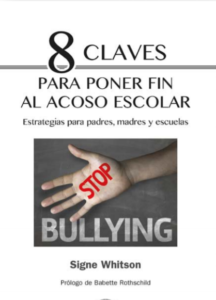What Parents Can Do When Bullying is Downplayed by School
October is National Bullying Prevention Month. In hopes for more civility and decency nationwide, among  people of ALL ages, I’ll be sharing some key articles, strategies and insights. Please read and share with those who work and live with school-aged kids!
people of ALL ages, I’ll be sharing some key articles, strategies and insights. Please read and share with those who work and live with school-aged kids!
What Parents Can Do When Bullying is Downplayed by School
Your child is being bullied at school. He or she has mustered the courage to tell you about it—no small feat, considering how humiliating it can be for kids to tell their parents about maltreatment by their peers—and together, you have tried everything you can think of to manage the problem on your own.
Your child has practiced ignoring the bully, avoiding his tormentors, standing up to mean kids in assertive ways, trying to enlist his teacher’s support, and using humor to deflect the bully’s taunting. He has shut down his Facebook page and stopped texting entirely, hoping that taking himself out of the technology loop might give him some respite from the cruelty. Yet, the bullying persists … and is getting worse.
You make a decision to call your child’s teacher and report what has been going on—the name-calling, the cruel texts, the exclusion at lunch, the snickering in the halls, the shoves on the bus, and the threats of physical harm (yesterday’s warning: “I am going to f’ing end you if you come to school tomorrow”). Reaching out and asking for help was hard for you; as a parent, you desperately hoped to be able to protect your child on your own. Confident, however, that you have taken all of the right steps to manage the problem independently and knowing that the bullying (and your child’s desperation) are only getting worse, you reluctantly place a call to school. A part of you is relieved that your burden can now be shared and professionals can help with the job of keeping your child safe at school.
Your relief is short-lived.
Despite the “Bully-Free Zone” posters that line the school cafeteria walls and the Zero-Tolerance Policy that was boasted about during last September’s back-to-school night, your experience is that the school would rather not address the problem at all. The responses you get from your child’s teacher include bland lip service such as:
• I didn’t see it happening and I can’t just take your child’s word that it did.
• Kids will be kids, you know.
• This stuff just happens. It’ll all blow over soon.
• Your child just needs to have a thicker skin.
• The child you are accusing of bullying is an honor student and vice president of the student council. I just can’t believe he would do such a thing. Are you sure your child isn’t exaggerating?
More and more, as I talk with parents whose children have experienced bullying, they share this common experience of having their concerns downplayed by the very adults who are charged with keeping schoolchildren safe.
Now, before I go any further, I want to state my unequivocal support for most educators and school personnel. I have had the distinct honor and pleasure of working with hundreds of them in a professional capacity, and dozens of them through my own children’s schooling, and I recognize their role as monumental. It is my belief that most adults who dedicate their professional lives to education are heroes and I thank them endlessly for their service.
With that said, there are also adults who fail children and I don’t know any more eloquent or sophisticated way to describe my feelings about it other than to tell you that it burns me. While I understand that kids are often mean to each other—and sometimes unspeakably cruel—what I cannot wrap my mind around is when adults knowingly allow it to happen. Parents ask me: What should I do when I report bullying to school and the school downplays my concerns? This is the conversation we usually have.
First, we usually talk a bit about why some school personnel downplay reports of bullying from concerned parents.
Lack of Awareness
One recent study reports that in school settings, bullying is missed by adults 96% of the time. “How can this be?” many parents ask. Easier than it seems, I am afraid. While most teachers are very focused on what goes on in their classrooms, the majority of bullying occurs in locations like the lunchroom, the locker room, the playground, the bathroom, the hallways, the bus, and perhaps most infamously, online. When classroom teachers tell concerned parents that they are not aware of bullying incidents taking place in their classroom, they are usually quite accurate. (Why more cafeteria aides and bus drivers aren’t trained and made responsible for recognizing and responding to bullying is a whole different article.)
The flip side of adult awareness is that the thrice-failed-third-grade neighborhood meanie named Spike who jumps out in the schoolyard and demands little kids’ lunch money is a bully of yesteryear. Today’s bullies—particularly those who use relational aggression to hurt and humiliate—are often brilliant social diagnosticians who know how to manipulate their teachers just as effectively as they know how to torture their peers. Yes, the straight-“A” student council president may well be the bully that “rules the school” safely below the radar of his unsuspecting teachers.
The remainder of this post is available on Psychology Today. Click below for the direct link or cut and paste the following one in your browser: https://www.psychologytoday.com/us/blog/passive-aggressive-diaries/201203/what-parents-can-do-when-bullying-is-downplayed-school

Leave a Reply